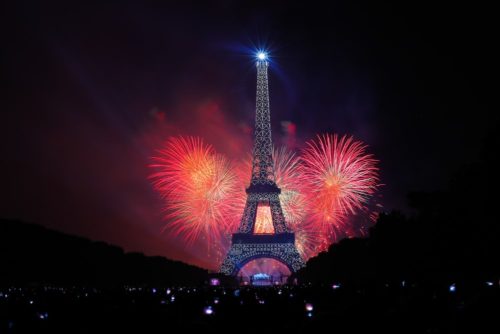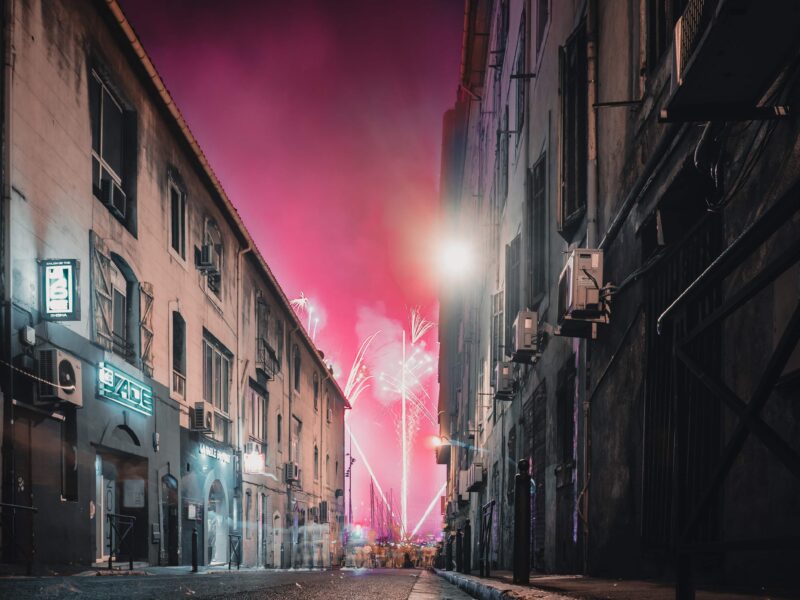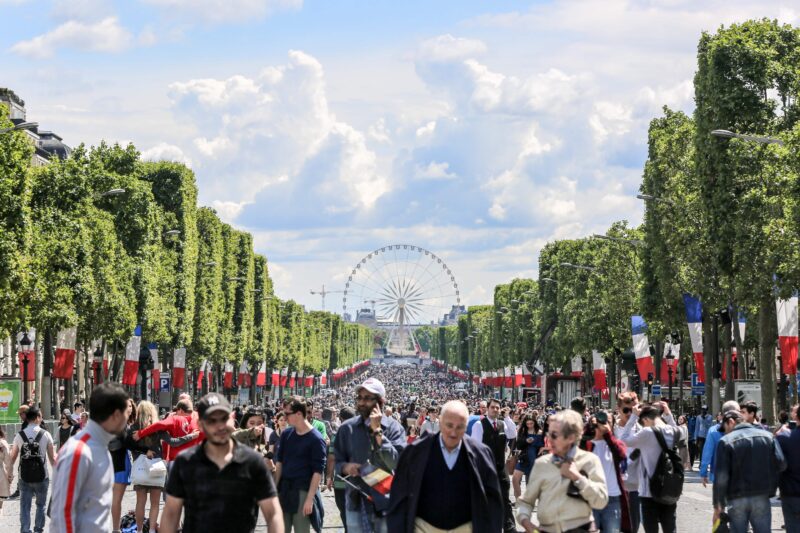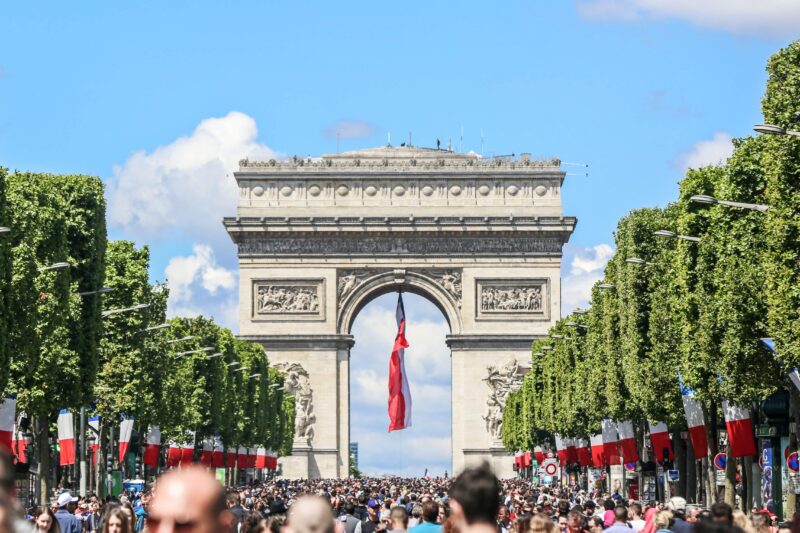
Bastille Day in French: Language, History, Traditions and More
“Allons, enfants de la Patrie: le jour de gloire est arrivé!” — “Let’s go, children of the fatherland: the day of glory has arrived!”
You’ve probably heard these famous lyrics from“La Marseillaise,“ France’s national anthem, which is sung for Bastille Day celebrations.
The revolutionary spirit of the song is perfect for this national holiday, which was born out of one of history’s most turbulent periods: the French Revolution.
If you want to join in on the Bastille Day celebrations, I’ve put together a guide to understanding what the holiday is, how to celebrate it and most importantly, how to talk about Bastille Day in French!
Contents
- Names for Bastille Day in French
- Bastille Day Greetings
- Historical Bastille Day Vocabulary
- Vocabulary for Celebrating Like a Local
- Vocabulary for the Parade
- Vocabulary for the Holiday Picnic
- Learn French with Bastille Day Activities
- What Is Bastille Day and Why Is It Important?
- How French People Celebrate Bastille Day
Download: This blog post is available as a convenient and portable PDF that you can take anywhere. Click here to get a copy. (Download)
Names for Bastille Day in French
You’ll notice that there’s no French translation listed below for “Bastille Day.” That’s because the French don’t call it Bastille Day! English-speaking countries are the ones who adopted the term, so you shouldn’t use it when speaking in French.
Instead, you can say:
| Vocabulary | Meaning | Notes |
|---|---|---|
| La fête nationale française | The French national holiday | You can also just shorten the phrase and refer to the holiday as la fête nationale (the national holiday) or even abbreviate the latter to fête nat if you're speaking informally with friends. Note that this holiday isn't usually capitalized in French. |
| Le quatorze juillet | July 14th | This is a great time to remind yourself that unlike in English, French months aren't capitalized. |
| La fête du quatorze juillet | The July 14th holiday |
Bastille Day Greetings
| Vocabulary | Meaning | Notes |
|---|---|---|
| Bonne fête nationale! | Happy national holiday! | |
| Joyeux quatorze juillet! | Happy July 14th! | Note that when talking about holidays or birthdays such as in these instances, bonne (good) and joyeux (joyous) both roughly translate to "happy." |
Historical Bastille Day Vocabulary
| Vocabulary | Meaning | Notes |
|---|---|---|
| La révolution | The revolution | To refer to the French Revolution, simply say La Révolution Française. |
| La guerre | The war | |
| La victoire | Victory | |
| Le gouvernement | The government | |
| La monarchie | The monarchy | |
| Le roi | The king | |
| La reine | The queen | |
| La prison | The prison | |
| Les rebelles | The rebels | |
| L'émeute | A riot | To talk about the action of rioting, you can say manifester violemment (to protest violently). |
| La rébellion | The rebellion | You can also use la sédition, which means the same thing. |
| L'histoire | History |
Vocabulary for Celebrating Like a Local
| Vocabulary | Meaning | Notes |
|---|---|---|
| Vive la France! | Long live France! | |
| Qu'est-ce que tu vas faire pour célébrer le 14 juillet? | What are you doing to celebrate July 14th? | |
| Un drapeau | Flag | |
| feux d'artifice | Fireworks | It's worth noting that this phrase literally means "artificial fires," which is just one of the many examples of why French is so beautiful! |
| Le bouquet final | The grand finale | The phrase literally translates to "the final bouquet." |
| Un concert | A concert | |
| Célébrer | To celebrate | Both fêter and faire la fête (literally, "to make a party") also mean "to celebrate." |
| Une fête | A party | Depending on the context, fête can either mean "a holiday" or "a party. |
Vocabulary for the Parade
| Vocabulary | Meaning | Notes |
|---|---|---|
| La parade | The parade | You can also say le défilé, which means the same thing but is used more commonly when talking about a parade with soldiers. For example, you can say le défilé militaire (the military parade). |
| Regardons la parade aujourd'hui! | Let's watch the parade today! | |
| Défiler | To march | |
| Les chars | Parade floats | |
| La musique | Music | |
| La foule | The crowd | |
| Acclamer | To cheer | Both applaudir (to applaud) and encourager (to encourage) can usually be used interchangeably with acclamer. |
| L'armée | The military | |
| La police | The police | |
| Les pompiers | Firemen | |
| Le discours | A speech | You can also use l'allocution, which essentially means the same thing. |
| Le président | The president | Usually, the French President gives a speech during the July 14th celebrations. |
| Les ballons | Balloons | |
| Les confettis | Confetti |
Vocabulary for the Holiday Picnic
| Vocabulary | Meaning |
|---|---|
| Un pique-nique | A picnic |
| On va faire un pique-nique pour célébrer la fête nationale. Est-ce que tu voudrais nous accompanger? | We're having a picnic to celebrate the national holiday. Do you want to come with us? |
| Les amis | Friends |
| La famille | Family |
| La nourriture | Food |
| Le repas | Meal |
| La boisson | Drink |
| Un panier | A basket |
| Une couverture | A blanket |
| Dehors | Outside |
| Manger | To eat |
| Boire | To drink |
Learn French with Bastille Day Activities
Bastille Day is a great way to have some fun while brushing up on your French!
For starters, you can practice your reading skills by checking out some French-language articles about the history of Bastille Day in French, like this short article.
If you’re an upper-level French learner, try this more extensive historical article on L’Internaute.
For audio-visual learners, here’s a very informative French video about Bastille Day by Pratiks:
If you really want to embrace Bastille Day, you could learn the French national anthem by listening to the song and memorizing the lyrics, which might surprise you—they’re quite graphic!
You could even go all-out by throwing a Bastille Day party with your friends! You can cook French food, fly the French flag and speak in French during the celebration.
What Is Bastille Day and Why Is It Important?
Bastille Day honors the Fête de la Federation (Festival of the Federation), which occurred on July 14, 1790, exactly one year after the Bastille prison in Paris was stormed by unhappy citizens.
The storming of the Bastille was one of the major events that began open rebellion in France in the summer of 1789, and it triggered the French Revolution.
Interestingly, the Bastille only held seven prisoners on the day it was stormed. and the act was a symbol of ending the power of the monarchy—since the prison was often used to hold those who opposed the royals. Perhaps even more importantly, the rebels needed to seize the large amount of gunpowder and cannons housed inside.
In the end, the leaders of the rebellion decided to demolish the prison to show that the monarchy’s hold over France was finished. Pieces of the Bastille were eventually sold as souvenirs, and the Marquis de Lafayette actually gave the prison’s key to George Washington as a gift. You can even see it on display today at Mount Vernon in New York State.
This important historical day was commemorated a year later with the Fête de la Federation, although with an effort to focus on unity as opposed to the bloodshed of the rebellion. A century later, July 14th became the French national holiday that’s celebrated today as Bastille Day.
If you’re interested in learning more about the storming of the Bastille and the French Revolution, Jacobin Magazine and Origins both have very detailed articles on the subject.
How French People Celebrate Bastille Day
People in France have found many ways to celebrate this commemorative day. For starters, Bastille Day is a French national holiday, so most people have the day off work, shops and businesses are closed and there’s generally a relaxed, holiday feel to the day.
Many people attend parades, the biggest being the famous annual military parade in Paris.
Others spend the day with family, having picnics, going to restaurants and hosting parties.
There are also often special discounts or free access to certain national museums, events and other historical sites on Bastille Day.
Finally, and perhaps most popular of all, is to go out at night, attend concerts and watch fireworks. The biggest celebration is a classical concert by the Eiffel Tower leading up to fantastic fireworks show above the iconic monument:
With all the excitement from reading about Bastille Day, you may have decided you want to learn the language. If so, consider checking out FluentU. This innovative language learning program uses authentic videos with embedded subtitles to help people learn French while watching entertaining videos, such as music videos, movie trailers and news clips—in other words, you learn while watching videos that you’re probably already watching anyway!
Now that you’re all set to celebrate one of the biggest French holidays, I wish you a joyeux 14 juillet (happy July 14th)!
Download: This blog post is available as a convenient and portable PDF that you can take anywhere. Click here to get a copy. (Download)





